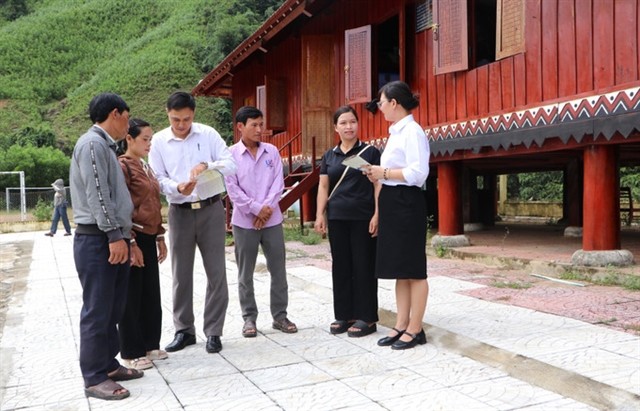 Society
Society


|
| Officers provide legal advice and consultancy to people in Qquang3 Ngãi central province. — Photo courtesy of the Quảng Ngãi Department of Justice |
QUẢNG NGÃI — In an effort to protect people’s lawful rights, maintain social order, and reduce poverty in mountainous areas, provinces are stepping up legal aid activities for ethnic communities, helping residents better understand the law and access justice.
Quảng Ngãi, a central province, is home to 43 ethnic groups, most of whom live in remote and mountainous areas with difficult socio-economic conditions, low educational attainment and limited awareness of the law.
As a result, many localities still experience disputes, conflicts and even legal violations due to a lack of understanding. Moreover, because of limited legal knowledge and economic constraints, many people find it difficult to access legal services or carry out necessary legal procedures.
From 2023 to last month, the State Legal Aid Centre No. 1 in Quảng Ngãi handled approximately 1,000 legal aid cases, provided legal aid and consultations for nearly 2,000 people, and organised about 60 communication and training sessions in ethnic group areas, attracting over 6,500 participants.
To further improve the quality of legal assistance for ethnic communities, the centre will continue to promote legal education so that residents in the communes, especially ethnic people, fully understand the law. The centre will also organise training courses to enhance the professional skills of commune-level legal officers and the consulting team of the centre.
It will host mock trials and simulate real-life situations to help people better understand and access legal support.
More aid in northern areas
The Legal Aid Branch No. 3 of the northern province Lào Cai was established on July 1 this year by merging the former Legal Aid Branch No. 3 in the formerly Văn Bàn District and Legal Aid Branch No. 4 in formerly Bảo Yên District. Since its establishment, the branch has ensured the right to legal aid for people following the merger.
Continuing to implement legal aid activities in accordance with the law, Legal Aid Branch No. 3 has proactively developed a plan specifying concrete legal aid activities suitable to local conditions.
The branch focuses on effectively carrying out professional tasks such as providing legal advice at the branch headquarters, participating in litigation to defend or represent legally aided individuals upon request, and planning well-organised legal aid communication campaigns under the national target programme in remote and especially difficult villages, including Bảo Yên, Nghĩa Đô, Thượng Hà, Xuân Hòa, Phúc Khánh, Bảo Hà, Võ Lao, Khánh Yên, Văn Bản, Dương Quỳ, Chiềng Ken, Minh Lương, Nậm Chày, and Nậm Xé.
However, after the merger, due to the wide coverage area and the majority of legal aid recipients being ethnic people living in areas with particularly difficult socio-economic conditions and vulnerable groups, combined with limited transportation and means for those receiving legal aid, accessing and benefiting from legal aid policies remains challenging.
Understanding these difficulties, the Lào Cai Provincial State Legal Aid Centre established a legal aid office directly in Bảo Yên Commune to facilitate easier access. Following the principle of legal aid 'close to the people, attentive to the people,' Legal Aid Branch No. 3 has strengthened cooperation with commune-level people's committees, monitored the number of eligible legal aid recipients, and proactively communicated and engaged with those receiving aid.
The branch has actively coordinated with prosecutorial agencies to provide defence and representation for legal aid recipients, aiming to protect their rights based on the law, uphold the rule of law, ensure social justice, raise public awareness, stabilise local political conditions and promote social development.
Since its establishment, Legal Aid Branch No. 3 has promptly received and handled 13 legal aid requests, covering criminal law (two cases), civil law (three cases), and marriage and family law (eight cases).
Among these, nine cases were handled through consultation, two cases involved defence participation, and two cases involved representation. All 13 aided individuals were ethnic people.
Determined to support local authorities, Legal Aid Branch No. 3 will continuously strive to complete all assigned tasks and implement a range of coordinated measures to resolve legal obstacles, support the people and vulnerable groups in accessing legal aid policies, and raise legal awareness.
In Lạng Sơn northern mountainous province, the provincial State Legal Aid Centre has conducted synchronised legal aid activities, including communication efforts, achieving many notable results. The centre collaborated with communal people's committees to organise 20 communication sessions in villages across the province. These sessions attracted over 2,190 people, including eligible legal aid recipients and interested local residents.
During these sessions, the centre’s presenters introduced the rights and obligations of legal aid beneficiaries, the centre’s functions and responsibilities, and how to contact the centre. They also addressed legal questions and provided materials and leaflets about legal aid. These activities not only raised legal awareness but also created opportunities for the public to directly and effectively access legal aid policies. — VNS




